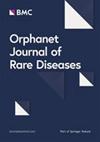SATURN: assessing the feasibility of utilising existing registries for real-world evidence data collection to meet patients, regulatory, health technology assessment and payer requirements
IF 3.4
2区 医学
Q2 GENETICS & HEREDITY
引用次数: 0
Abstract
SATURN (Systematic Accumulation of Treatment practices and Utilisation, Real world evidence, and Natural history data) for the rare condition osteogenesis imperfecta (OI) has the objective to create a common core dataset by utilising existing, well-established data sources to meet the needs of the various stakeholders (physicians, registry/dataset owners, patients and patient associations, OI community leaders, European [EU] policymakers, regulators, health technology assessments [HTA]s, and healthcare systems including payers). This paper describes the steps taken to assess the feasibility of one existing OI registry (i.e., the Registry of OI [ROI]) as a candidate for SATURN. The same methodology will be applied to other existing OI registries in the future and this same concept could be utilised for other rare disease registries. The approach to assessing the feasibility of the ROI registry consisted of three steps: (1) an assessment of the registry characteristics using the Registry Evaluation and Quality Standards Tool (REQueST); (2) a gap analysis comparing SATURN required Core Variables to those being captured in the registry’s Case Report Form (CRF); and (3) a compliance check on the data exchange process following the Title 21 of Code of Federal Regulations (CFR) Part 11/EudraLex Annex 11 Compliance Checklist. The first registry that SATURN has assessed is the ROI database at the Istituto Ortopedico Rizzoli (IOR) in Italy. The results from the ROI REQueST have demonstrated satisfactory complete responses in terms of methodology, essential standards, interpretability, and interoperability—readiness for data linkage, data sources, and ethics to meet the needs of data customers. However, the ROI data is from a tertiary referral centre which may limit the ability to understand the full patient journey. The gap analysis has revealed that an exact or logical match between SATURN requested variables and the ROI current variables exists for the following items: patient characteristics, treatment of OI (medical and surgical) and treatment of pain (with the exception of frequency of treatment and reasons for discontinuation), fracture history and bone density. However, data on safety was missing. The compliance check has implied that the ROI implemented appropriate controls for the web-based platform (i.e., Genotype–phenotype Data Integration Platform [GeDI]) that is involved in processing the electronic patient data, and GeDI is a validated/compliant application that follows relevant 21 CFR Part 11/EudraLex Annex 11 regulations. This robust feasibility process highlights potential limitations and opportunities to develop and to refine the collaboration with the ROI as the SATURN programme moves forward. It also ensures that the existing datasets in the rare condition OI are being maximised to respond to the needs of patients, data customers and decision-makers. This feasibility process has allowed SATURN to build a compliant methodology that aligns with the requirements from the European Medicines Agency (EMA) and HTAs. More data variables will continue to be developed and refined along the way with more registries participating in SATURN. As a result, SATURN will become a meaningful and truly collaborative core dataset, which will also contribute to advancing understanding of OI diagnosis, treatment, and care.SATURN:评估利用现有登记处收集真实世界证据数据的可行性,以满足患者、监管机构、卫生技术评估和支付方的要求
针对罕见疾病成骨不全症(OI)的 SATURN(治疗实践和利用、现实证据和自然病史数据的系统性积累)旨在利用现有的、成熟的数据源创建一个通用的核心数据集,以满足不同利益相关者(医生、注册表/数据集所有者、患者和患者协会、OI 社区领袖、欧洲[欧盟]政策制定者、监管者、健康技术评估[HTA]和医疗保健系统,包括支付者)的需求。本文介绍了为评估将一个现有的 OI 登记处(即 OI 登记处 [ROI])作为 SATURN 候选者的可行性而采取的步骤。同样的方法今后将应用于其他现有的 OI 登记处,同样的概念也可用于其他罕见病登记处。评估 ROI 登记册可行性的方法包括三个步骤:(1) 使用登记册评估和质量标准工具 (REQueST) 评估登记册的特征;(2) 将 SATURN 要求的核心变量与登记册病例报告表 (CRF) 中捕获的核心变量进行差距分析;(3) 按照《联邦法规汇编》(CFR) 第 21 篇第 11 部分/EudraLex 附件 11 合规性检查表对数据交换过程进行合规性检查。SATURN 评估的第一个登记处是意大利 Istituto Ortopedico Rizzoli (IOR) 的 ROI 数据库。ROI REQueST 的结果表明,在方法、基本标准、可解释性和互操作性--数据链接、数据来源和伦理道德的准备程度等方面,完全符合数据客户的需求,令人满意。然而,投资回报率数据来自三级转诊中心,这可能会限制了解患者整个就医过程的能力。差距分析表明,SATURN 要求的变量与 ROI 当前变量在以下项目上存在精确或逻辑匹配:患者特征、OI 治疗(内科和外科)和疼痛治疗(治疗频率和中断原因除外)、骨折史和骨密度。但是,缺少有关安全性的数据。合规性检查表明,投资回报率对处理患者电子数据的网络平台(即基因型-表型数据集成平台 [GeDI])实施了适当的控制,GeDI 是一个经过验证/合规的应用程序,遵循相关的 21 CFR Part 11/EudraLex Annex 11 法规。随着 SATURN 计划的推进,这一稳健的可行性流程凸显了潜在的局限性以及发展和完善与 ROI 合作的机会。它还能确保罕见病 OI 中的现有数据集最大限度地满足患者、数据客户和决策者的需求。这一可行性过程使 SATURN 能够建立符合欧洲药品管理局 (EMA) 和 HTA 要求的方法。随着越来越多的登记处加入 SATURN,更多的数据变量将继续得到开发和完善。因此,SATURN 将成为一个有意义的、真正合作性的核心数据集,这也将有助于加深对 OI 诊断、治疗和护理的理解。
本文章由计算机程序翻译,如有差异,请以英文原文为准。
求助全文
约1分钟内获得全文
求助全文
来源期刊

Orphanet Journal of Rare Diseases
医学-医学:研究与实验
CiteScore
6.30
自引率
8.10%
发文量
418
审稿时长
4-8 weeks
期刊介绍:
Orphanet Journal of Rare Diseases is an open access, peer-reviewed journal that encompasses all aspects of rare diseases and orphan drugs. The journal publishes high-quality reviews on specific rare diseases. In addition, the journal may consider articles on clinical trial outcome reports, either positive or negative, and articles on public health issues in the field of rare diseases and orphan drugs. The journal does not accept case reports.
文献相关原料
| 公司名称 | 产品信息 | 采购帮参考价格 |
|---|
 求助内容:
求助内容: 应助结果提醒方式:
应助结果提醒方式:


